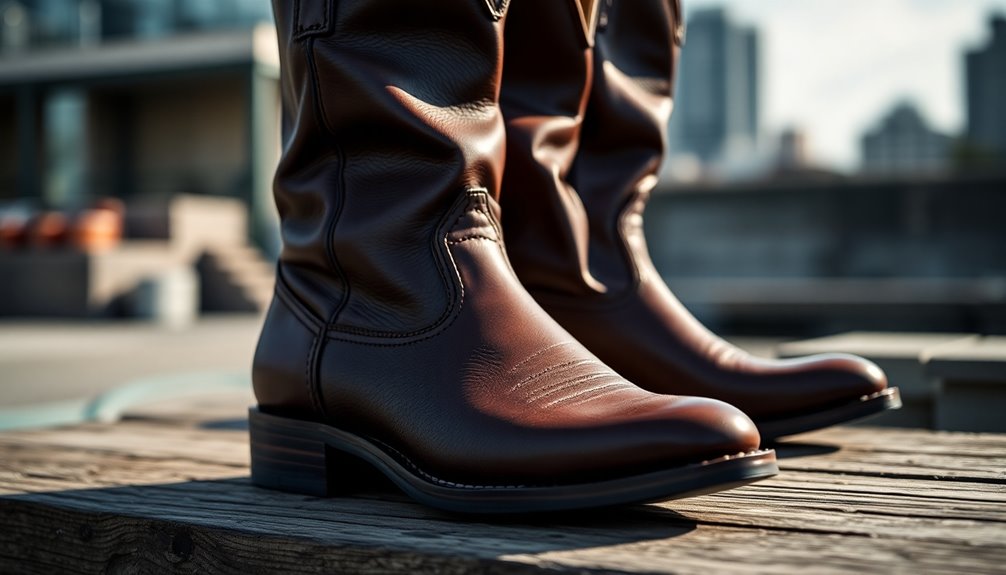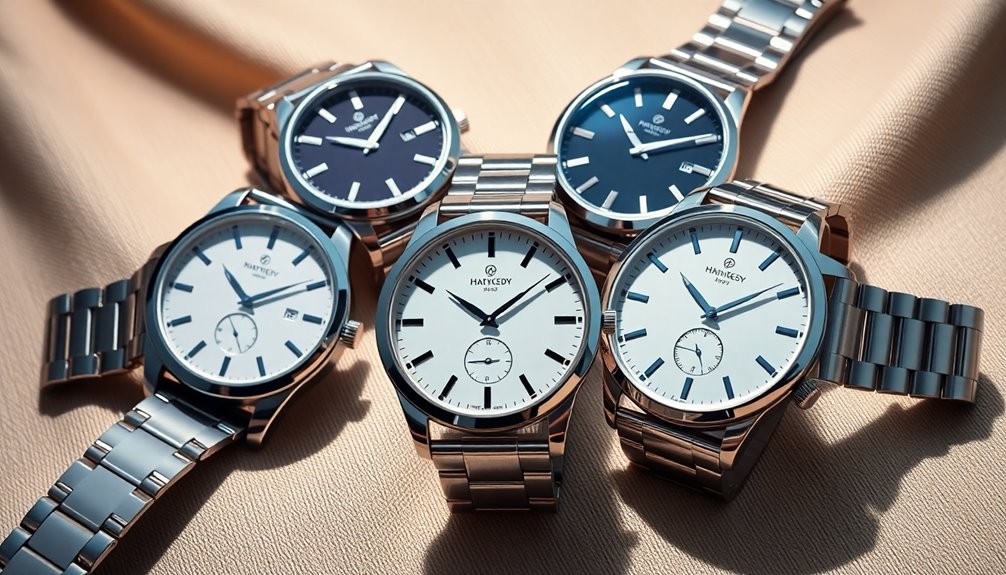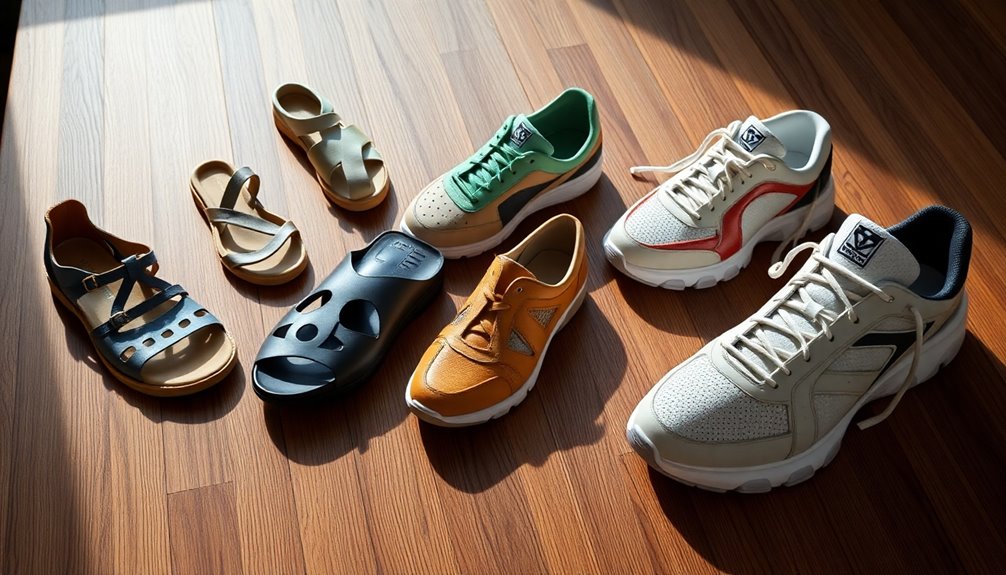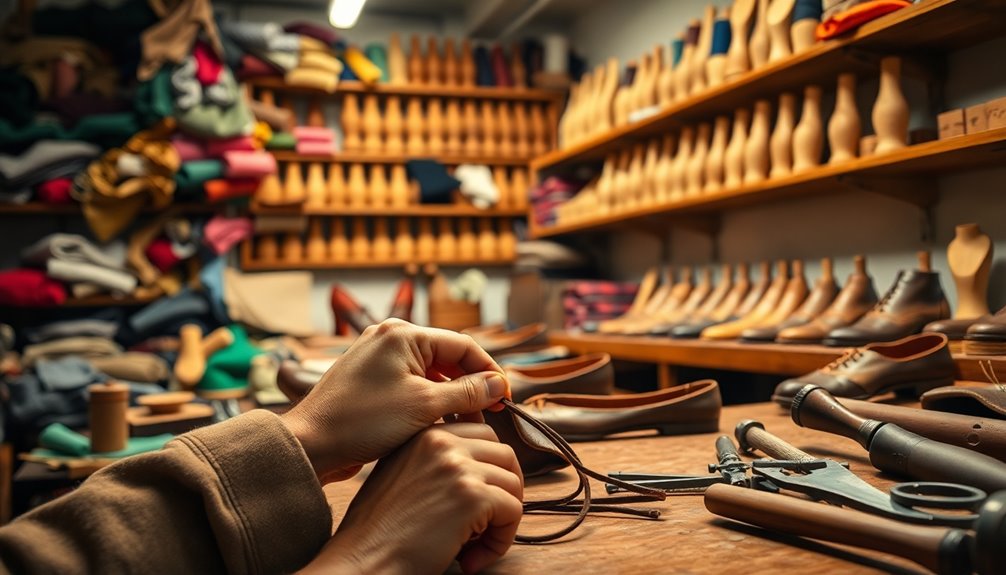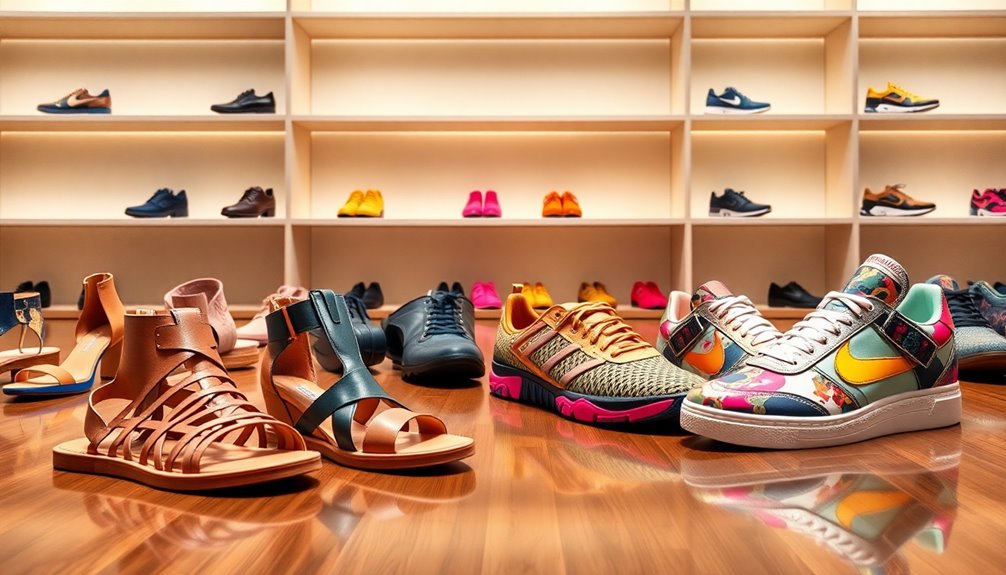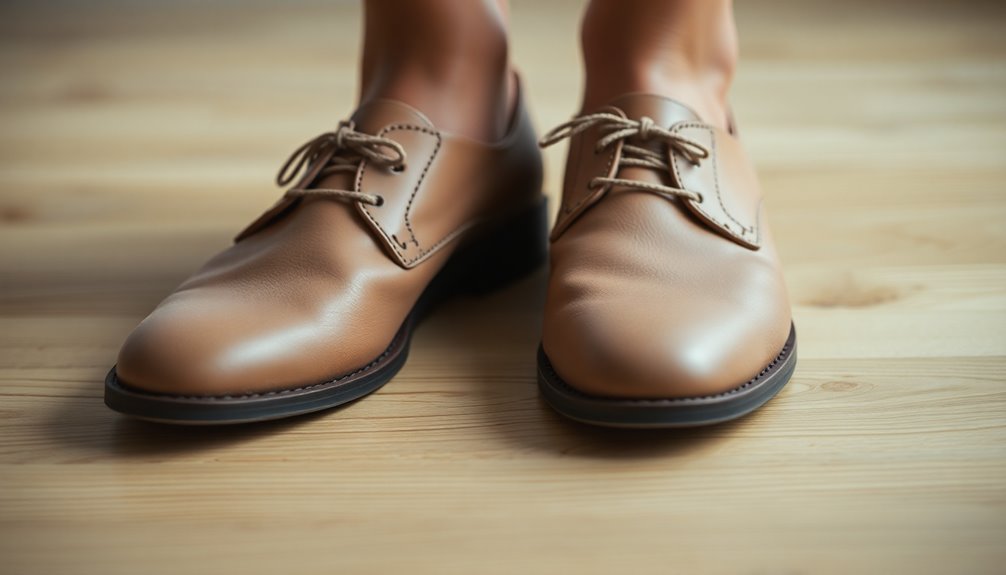If you're looking for boots that combine unmatched quality and cutting-edge style, Israeli footwear has you covered. Rooted in a rich history of craftsmanship, these boots showcase innovative designs made from advanced materials like carbon fiber and waterproofing technologies. They're crafted not just for aesthetics but also prioritize health, with features like dynamic compression for better circulation. As consumer preferences shift towards sustainability and luxury, Israeli brands have adapted to meet these demands. Discover the many types of Israeli boots available, and you'll find the perfect pair to fit your lifestyle and values.
Key Takeaways
- Israeli boots are crafted with advanced materials like carbon fiber plates, enhancing performance and durability for various activities.
- Local designers blend traditional craftsmanship with innovative techniques, creating unique and stylish footwear options for consumers.
- The footwear industry focuses on health and wellness, with designs that address medical conditions while maintaining comfort and style.
- Innovations such as laceless designs and waterproofing advancements ensure a custom fit and protection in diverse weather conditions.
- The growing demand for premium, eco-friendly options reflects consumer preferences for quality and sustainability in boot choices.
The Evolution of Israeli Footwear
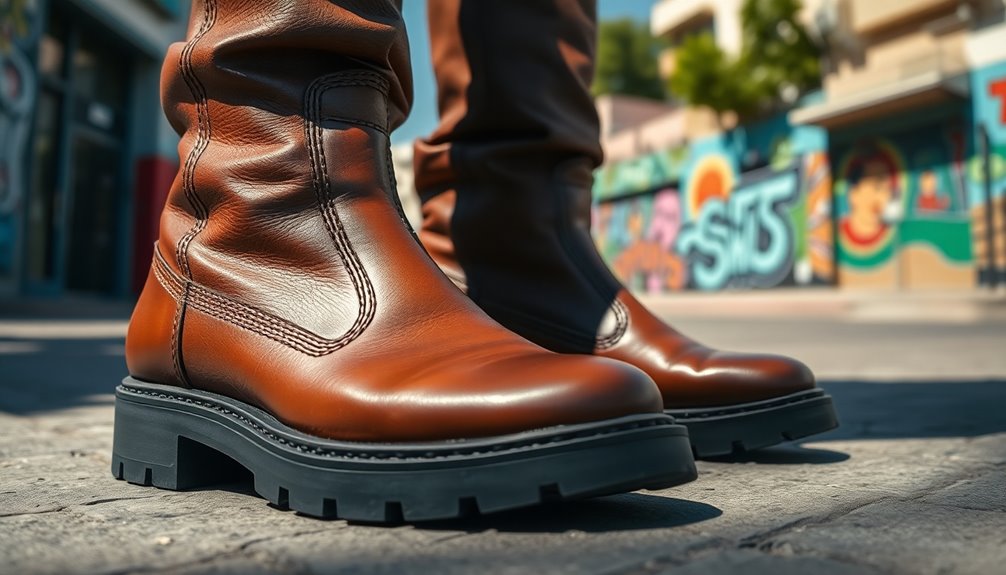
The evolution of Israeli footwear reflects the country's rich history and adaptability. You might be surprised to learn that the industry traces back to the 1940s when skilled shoemakers from Czech and Austria established factories in kibbutzim. One notable factory, set up in Kibbutz Neot Mordechai in 1946, still operates today.
Initially, production focused on serving local communities, but it soon expanded to larger markets, thanks to companies like Nimrod, which crafted iconic models such as the biblical sandal.
However, the industry faced significant challenges in the 1990s due to reduced tariffs on imports, leading to financial losses for many domestic manufacturers. Companies like Teva Naot encountered difficulties but adapted through innovative strategies, focusing heavily on export markets. Today, about 70% of Teva Naot's revenue comes from international sales.
As the market evolved, Israeli footwear transitioned from utilitarian designs to fashion-forward creations. Designers began incorporating unique materials and inspirations, resulting in a vibrant blend of comfort, style, and technological innovation. Notably, many contemporary designers, such as Kobi Levi, have influenced this shift by creating high-heeled shoes that serve as a form of artistic expression.
This adaptability has made Israeli footwear a significant player in the global market, showcasing its rich heritage while embracing modern trends.
Health and Wellness Influence
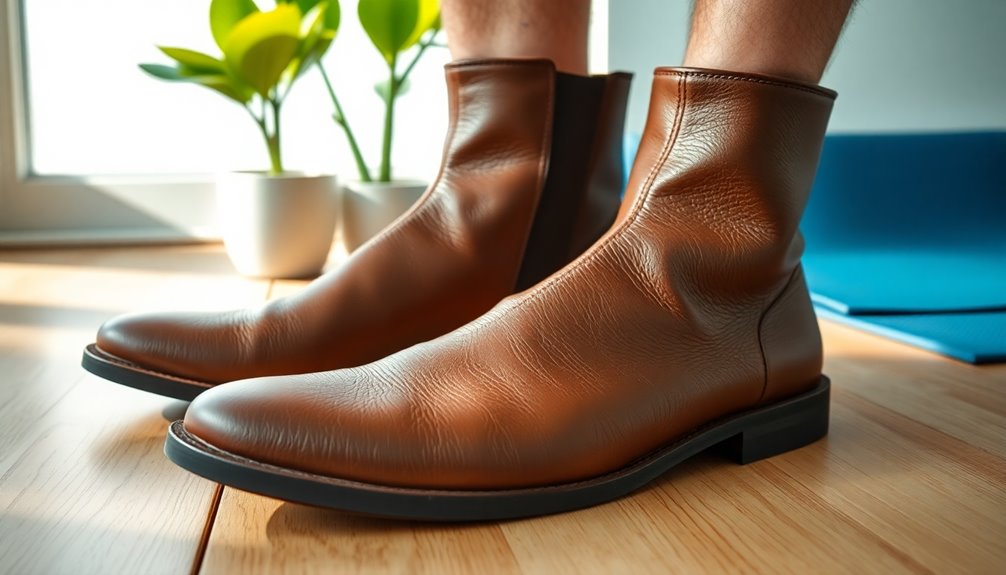
Israeli boots have evolved not just in style but also in their focus on health and wellness. These innovative designs offer benefits that go beyond conventional footwear, addressing specific medical conditions like Chronic Venous Insufficiency (CVI) and Deep Vein Thrombosis (DVT).
By utilizing dynamic compression therapy, these boots enhance blood circulation, helping to prevent DVT and aiding the healing of venous ulcers and lymphoedema. Additionally, they are part of a growing movement in healthcare that aims to improve patient outcomes through innovative treatment solutions.
You'll appreciate the fact that the boots operate using your own kinetic energy, requiring no external power source. This feature allows you to maintain your regular lifestyle while receiving effective treatment.
Plus, their design promotes high compliance, making it easier for you to engage in daily activities without restriction.
Clinical trials, including those at Soroka Medical Center, have validated their effectiveness, leading to FDA approval for specific devices.
With over 40 million Americans suffering from lymphatic or venous disorders, these boots significantly improve quality of life by preventing disease recurrence and promoting self-rehabilitation.
Economic Challenges Ahead
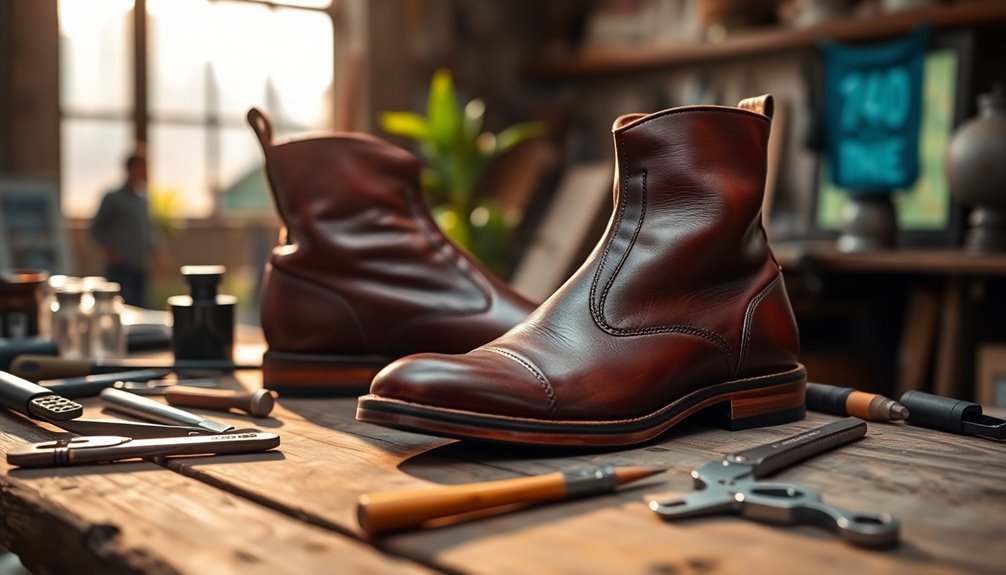
Israel's economy faces significant challenges as ongoing conflict takes its toll on various sectors. Defense spending has skyrocketed, projected to reach 250 billion shekels ($66 billion) by the end of 2024. This surge has led to downward revisions in GDP growth projections, now estimated between 1% to 1.9% for 2024.
Construction projects have stalled, while agricultural activities in conflict zones have seen production decline by a quarter. The tourism sector, once a vibrant part of Israel's economy, has been decimated, witnessing a staggering 75% drop in visitors, which severely impacts local businesses. Furthermore, the economic situation has intensified competition among brands in Israel, as new entrants primarily target the sports footwear segment.
The high-tech industry, a key driver of growth, is also feeling the strain due to reservist mobilization and a drop in venture capital investments. With around 360,000 reservists called up, many small and medium-sized businesses struggle to maintain operations.
Additionally, the psychological toll of the conflict is affecting workforce productivity and morale. The government faces financial strains too, with a budget deficit that has doubled to 8% of GDP, alongside rising inflation that erodes purchasing power.
These economic challenges are significant, and the road ahead will require resilience and innovation.
Growing Online Sales Channels
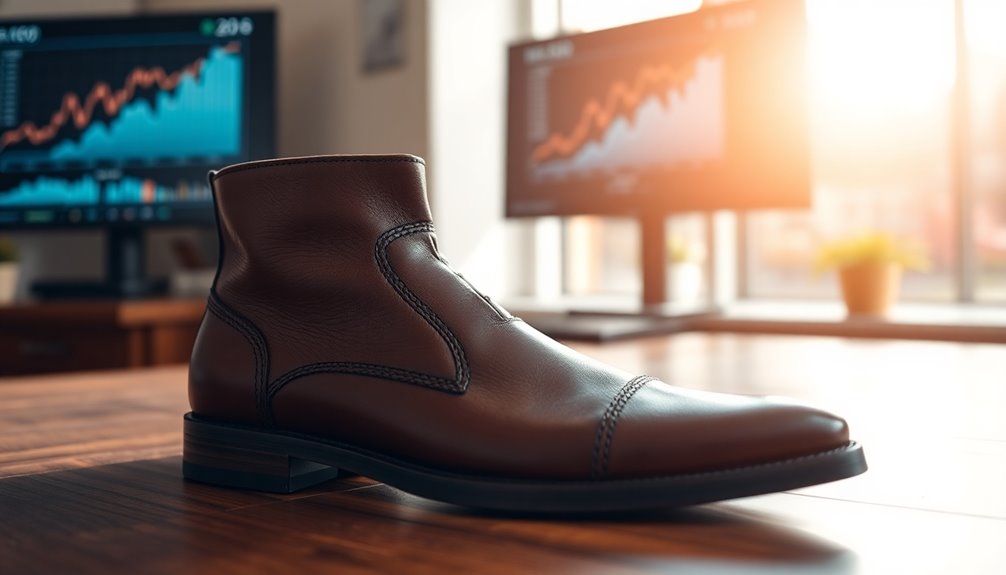
Amid economic challenges, a notable shift is occurring in how consumers shop for footwear. In 2023, online sales in the Israeli footwear market are expected to grow significantly, capturing a substantial share of the overall category.
You'll find that convenience and accessibility are driving this trend, as more people opt for online purchases through desktops, tablets, and smartphones.
The athleisure trend is pushing demand for sports and casual footwear, which you can easily find online. Health and wellness trends further boost the popularity of sports footwear, enhancing online sales. Additionally, the overall market is projected to grow, with a significant portion of this growth attributed to the increase in market volume.
As Israel emerges as both a production hub and a consumer market, you'll notice that major brands like Nike and Adidas are investing heavily in their online presence to meet growing demand.
Online channels offer a wider range of styles and brands, allowing you to explore options that mightn't be available in traditional stores.
While offline channels experience modest growth, e-commerce platforms, catalogs, and digital retail methods are rapidly transforming the shopping experience, making it easier than ever for you to find the perfect pair of boots.
Competitive Landscape Analysis
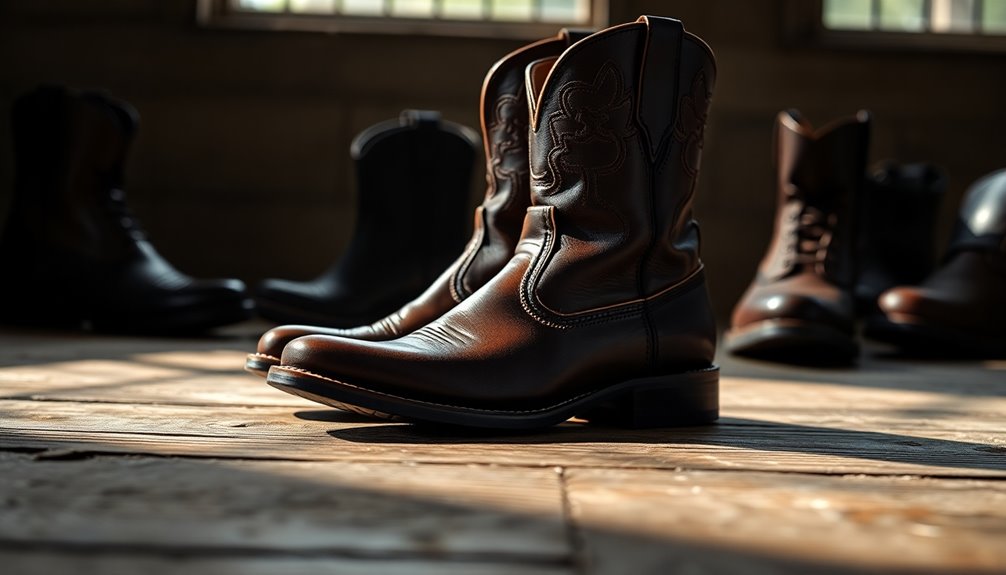
Entering a vibrant market, new international players are shaking up the competitive landscape of footwear in Israel, particularly in the sportswear segment. Brands like Alo Yoga and Lululemon have made a splash by opening their first stores, adding pressure to established giants like adidas and Nike. These leading brands, which account for over 30% of footwear value sales, now face intensified competition from these newcomers.
Despite a challenging economic climate marked by rising interest rates and high inflation, the demand for sports footwear remains strong, driven by health and wellness trends. While consumers are tightening their belts and limiting non-essential purchases, the focus on active lifestyles is a silver lining for the sportswear category. The growth potential identified in dual sport and adventure categories reflects the increasing consumer interest in versatile riding equipment. Additionally, the importance of maintaining a strong home security system is becoming increasingly relevant for consumers investing in high-value sportswear.
As the online sales landscape expands, traditional retail channels are experiencing modest growth, further shifting the competitive dynamics. The depreciation of the shekel against the dollar adds to the challenges for importing brands, increasing their costs.
With rising operational expenses—like electricity and rent—players in this market must navigate a complex environment, balancing innovation and competitiveness to maintain their market share.
Diverse Product Categories
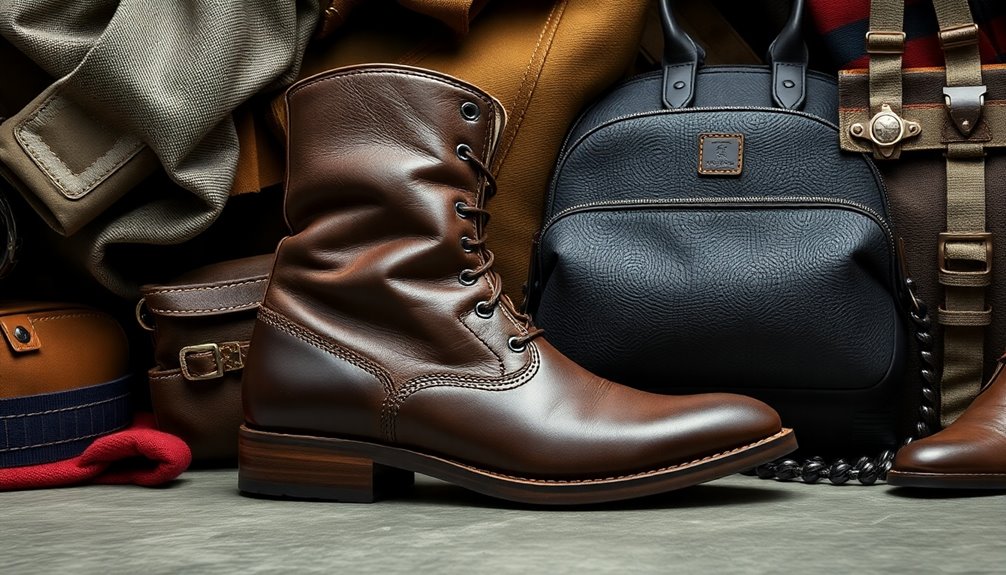
Diverse product categories in the footwear market offer something for everyone, catering to various needs and preferences.
If you're into fitness, athletic and training footwear provides the support and flexibility you need for running, weightlifting, and CrossFit. Brands like Nike, Adidas, and New Balance are popular choices, ensuring you're well-equipped for indoor and outdoor training.
For those who love adventure, boots come in different styles, from ankle boots to hiking boots. These are designed for durability and protection in various terrains and weather. The Teva-Naot Scout Commando Boots, used by Israeli Special Forces, exemplify rugged reliability, while brands like Blundstone are known for their comfort. Additionally, these boots are constructed from artificial materials, ensuring no animal leather is used.
If you're looking for something more formal, business and formal footwear includes polished leather shoes and classic oxfords, perfect for professional settings. These high-quality shoes enhance your business attire and evening wear.
Lastly, sandals remain a popular choice in Israel's warm climate, ranging from casual flip-flops to supportive walking sandals. Brands like Shoresh offer secure options for everyday use, making them a staple for both casual outings and special occasions.
With such a variety, you're sure to find the perfect pair!
Consumer Preferences and Trends
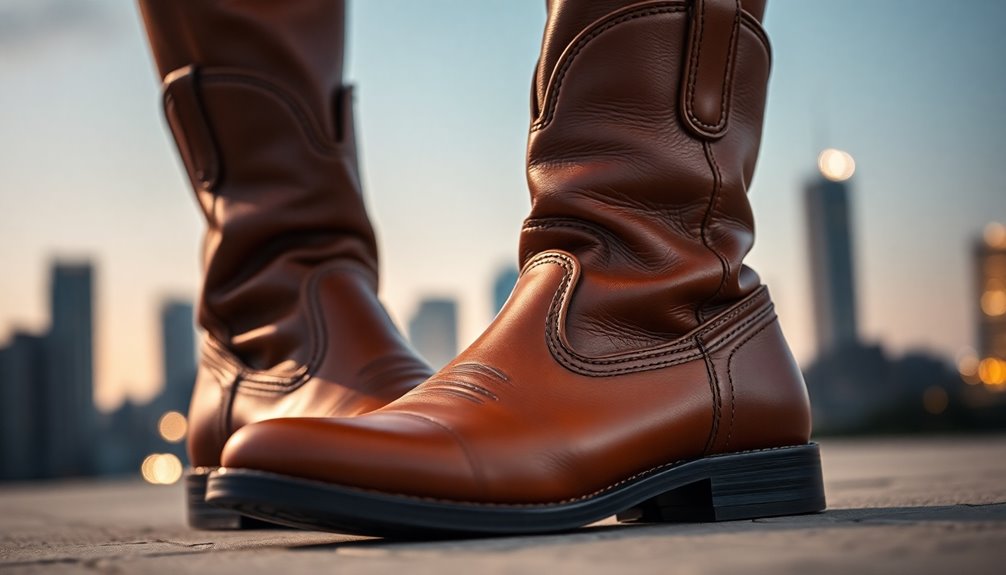
As the footwear market continues to evolve, consumer preferences and trends play a significant role in shaping the landscape. With rising disposable incomes, you might find yourself drawn to premium products, particularly stylish and luxurious boots. However, economic challenges in 2024, such as inflation, could impact your spending power, making it crucial to balance quality with necessity. Health and wellness trends are also influencing your choices, as you lean towards sports footwear that combines comfort and style. Understanding small mistakes in your purchasing decisions can help you make more informed choices. Fashion consciousness is on the rise, prompting you to invest in boots that not only look good but also align with current trends. The allure of high-quality leather products is undeniable, and consumers like you're willing to pay more for durability and longevity, especially in light of the increased competition in the market. Additionally, many consumers are now prioritizing sustainable materials when making their purchases, reflecting a broader shift towards eco-conscious decision-making. Interestingly, the growing emphasis on organic tea production in the food and beverage sector mirrors your desire for sustainable options in footwear. As online shopping continues to dominate, you appreciate the convenience and vast selection available at your fingertips. This shift toward online retail enhances your purchasing experience, allowing you to explore various options effortlessly. Ultimately, your preference for quality, durability, and style shapes the market, steering brands towards meeting your evolving needs and desires in footwear. Furthermore, the focus on safety standards in product materials is becoming increasingly important for consumers seeking long-lasting footwear.
Innovations in Boot Design
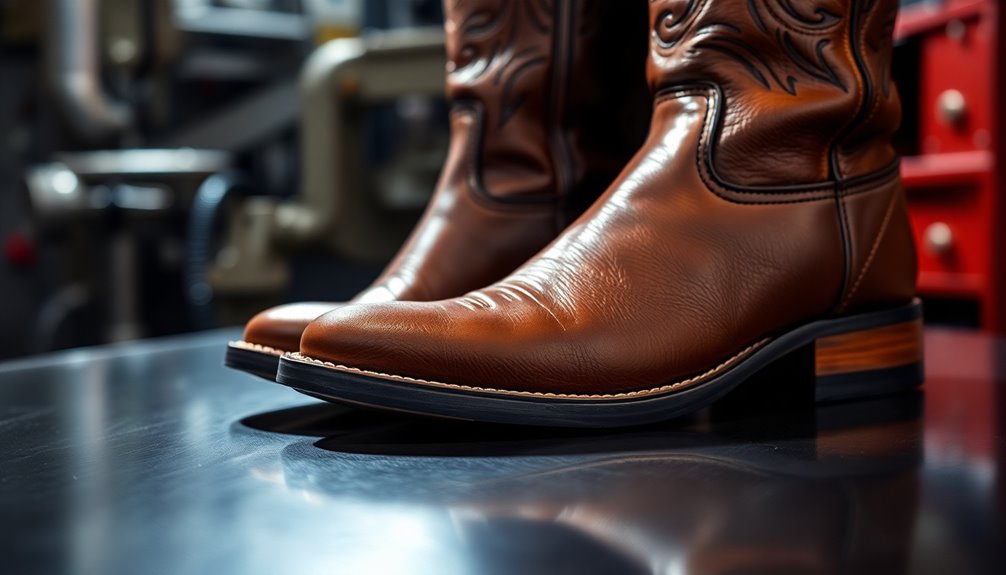
In recent years, boot design has undergone a remarkable transformation, driven by technological advancements and creative innovation. You'll notice that Israeli boots now feature advanced materials like carbon fiber plates and Vibram outsoles, enhancing performance and durability. The introduction of laceless designs, such as those from Naked Sports Innovations, allows for a custom fit that adapts to your foot's shape, improving comfort and ground feel. Energy return technology in midsoles makes each step feel light, especially on uneven terrain, while waterproofing advancements have moved away from traditional leather soles to ensure your feet stay dry. Additionally, the influence of designers from the Bezalel Academy is evident, blending traditional craftsmanship with radical materials to create unique footwear that's both functional and artistic.
As you explore these innovations, you'll find that many designers prioritize handmade quality and attention to detail, ensuring that each pair not only meets your needs but also reflects a commitment to style and sustainability. The rise of local designers and brands has further propelled the industry forward, contributing to a vibrant Israeli footwear market that continues to inspire global fashion trends.
Collectively, these advancements in boot design illustrate how the industry has evolved, keeping pace with consumer preferences and setting new standards in quality.
Future Market Projections
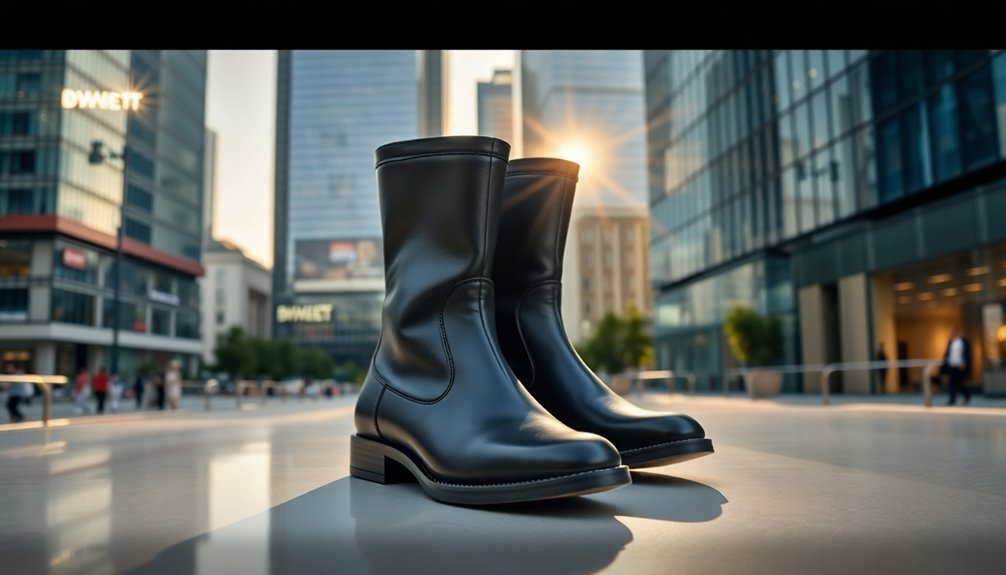
The innovations in boot design signal a shift in market dynamics, shaping future projections for the industry. Health and wellness trends are driving demand for sports footwear, including boots, but economic challenges like inflation and interest rate hikes may slow growth in the Israeli market in 2024.
You'll notice that online sales are set to surge, capturing a larger share of the market, while traditional retail channels will experience modest growth as consumers increasingly prefer e-commerce.
New entrants focusing on sports footwear will intensify competition, challenging established players like adidas and Nike. As these brands adapt to changing consumer preferences, they'll need to innovate and differentiate their offerings to maintain their market position.
The competitive landscape will also shift, as pricing and sales strategies may be influenced by the influx of new players. Economic conditions might lead you to adjust your purchasing habits, opting for more affordable options or delaying non-essential buys like boots.
As the market evolves, companies that leverage online platforms effectively and respond to consumer needs will thrive, ensuring that the future of boot sales remains dynamic and competitive. Additionally, understanding the importance of citing sources accurately will play a critical role in establishing credibility for emerging brands in the competitive landscape.
Frequently Asked Questions
What Materials Are Commonly Used in Israeli Boot Production?
When you look into Israeli boot production, you'll find a variety of materials.
Full grain water-resistant leather and durable CORDURA® nylon fabric are common choices. Some models even use genuine suede or synthetic materials.
The soles are typically made from polyurethane or vulcanized rubber, while breathable mesh fabric lining and removable antibacterial insoles add comfort.
Each boot reflects a commitment to quality, ensuring they withstand rigorous use in various environments.
How Do Israeli Boots Compare in Price to International Brands?
When you compare Israeli boots to international brands, you'll find that Israeli options generally fall within a mid-range price bracket, typically between $70 and $280.
In contrast, international brands like Diesel or HUGO can cost significantly more, often exceeding $400.
If you're budget-conscious, Israeli brands offer quality without breaking the bank, especially when you consider shipping costs from abroad can add up quickly.
Are There Sustainable Options Available in Israeli Boot Collections?
Yes, you'll find plenty of sustainable options in Israeli boot collections.
Brands like Balena offer 3D-printed shoes made from compostable plastics that decompose in just six months.
You can also explore Teva-Naot, which uses artificial materials to avoid animal leather.
D'ORO provides stylish vegan alternatives, and many brands utilize recycled materials to minimize environmental impact.
These options not only look good but also reflect a commitment to eco-friendly practices.
What Are the Best Care Practices for Maintaining Leather Boots?
To maintain your leather boots, start by removing dirt with a soft brush or cloth.
Use a leather cleaner for deeper cleaning, avoiding water and harsh chemicals.
After cleaning, apply a leather conditioner to keep the leather supple and prevent cracking.
Regularly polish your boots for a shiny appearance and protect them with waterproof treatments.
Store them in a cool place, and let wet boots dry naturally to preserve their quality.
How Can I Find Local Retailers Selling Israeli Boots?
To find local retailers selling Israeli boots, start by searching online directories for shops specializing in footwear.
Visit local craft fairs or markets to discover handmade options.
Check out boutique stores known for artisanal brands, and don't forget to explore specialized military supply stores for tactical boots.
You can also look for online retailers that focus on Israeli footwear.
Finally, read customer reviews to ensure you're choosing reputable shops.
Conclusion
In conclusion, Israel's boot industry stands out for its blend of quality and innovative design. As you explore diverse styles, you'll notice a strong influence from health and wellness trends, shaping what consumers want. With the rise of online sales and a competitive market, the future looks promising. Embracing these changes, you're likely to find stylish, comfortable boots that meet your needs, making each step a testament to Israel's commitment to craftsmanship and innovation.
